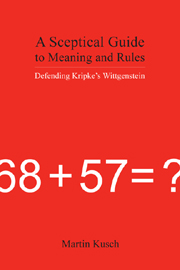Book contents
Preface
Summary
This essay is an interpretation and defence of Saul Kripke's book Wittgenstein on Rules and Private Language (WRPL). To write about Kripke's Wittgenstein hardly needs a special justification; after all, over the past thirty years, more than five hundred authors have done likewise. However, the promise of an “interpretation” and a “defence” of Kripke's book is likely to raise more than just a few eyebrows: is not Wittgenstein on Rules and Private Language much too clear and punchy to need anything like “an interpretation”? And can one possibly defend a text that has been refuted dozens and dozens of times, both as an outline of a particular take on meaning and content, and as an interpretation of Wittgenstein? Let me address these two questions in turn.
Like many other readers I too believe that Kripke's book raises the traditional debate over meaning and content to a new and higher level of clarity and transparency. But as the debate over Wittgenstein on Rules and Private Language has brought to the surface, some of the apparent simplicity of Kripke's text is deceptive. For instance, it is not immediately clear whether the dialogical setting of the book is essential to the argument.
Information
- Type
- Chapter
- Information
- A Sceptical Guide to Meaning and RulesDefending Kripke's Wittgenstein, pp. xiii - xviiPublisher: Acumen PublishingPrint publication year: 2006
